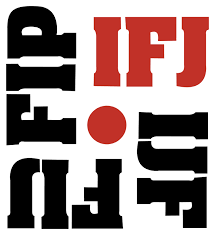Related Research Articles

The World Federation of Trade Unions (WFTU) is an international federation of trade unions. WFTU was established in 1945 to replace the International Federation of Trade Unions.

The Communist Party was a Left Communist organisation established at an emergency conference held on 19–20 June 1920 at the International Socialist Club in London. It comprised about 600 people.

The International Federation of Journalists (IFJ) is a global union federation of journalists' trade unions—the largest in the world. It represents more than 600 000 media workers from 187 organisations in 146 countries.

The International Textile, Garment and Leather Workers' Federation (ITGLWF) was a global union federation. In 2005 it had 217 member organizations in 110 countries, representing a combined membership of over 10 million workers.
The National Minority Movement was a British organisation, established in 1924 by the Communist Party of Great Britain, which attempted to organise a radical presence within the existing trade unions. The organization was headed by longtime unionist Tom Mann and future General Secretary of the CPGB Harry Pollitt.

The General Federation of Trade Unions (GFTU) is a national trade union centre in the United Kingdom. It has 35 affiliates with a membership of just over 214,000 and describes itself as the "federation for specialist unions".

The Amalgamated Association of Operative Cotton Spinners and Twiners, also known as the Amalgamation, was a trade union in the United Kingdom which existed between 1870 and 1970. It represented male mule spinners in the cotton industry.

The Irish Trades Union Congress (ITUC) was a union federation covering the island of Ireland.

IndustriALL Global Union is a global union federation, founded in Copenhagen on 19 June 2012.

The Irish Congress of Trade Unions, formed in 1959 by the merger of the Irish Trades Union Congress and the Congress of Irish Unions, is a national trade union centre, the umbrella organisation to which trade unions in both the Republic of Ireland and Northern Ireland affiliate.

The Trades Union Congress (TUC) is a national trade union centre, a federation of trade unions in England and Wales, representing the majority of trade unions. There are 48 affiliated unions, with a total of about 5.5 million members. The current General Secretary is Frances O'Grady.

The London Trades Council was an early labour organisation, uniting London's trade unionists. Its modern successor organisation is the Greater London Association of Trades (Union) Councils
The United Textile Factory Workers' Association (UTFWA) was a trade union federation in Great Britain. It was active from 1889 until 1975.
The South African Congress of Trade Unions (SACTU) was a national trade union federation in South Africa.
Arthur Shaw was a British trade union leader.
William Marsland was a British trade unionist.
Helen Frances McGrath was a Scottish trade unionist.
James Stott was a British trade union leader, who became secretary of the International Federation of Textile Workers.
The International Clothing Workers' Federation (IGWF) was a global union federation representing workers involved in making and repairing clothes.
The International Federation of Boot and Shoe Operatives and Leather Workers was a global union federation representing unions of shoemakers and leather workers, principally in Europe.
References
- 1 2 3 4 Fowler, Alan (2018). Lancashire Cotton Operatives and Work, 1900-1950. Routledge. ISBN 1351753207.
- ↑ "Obituary". Bulletin of the International Federation of Textile Workers' Associations. 1957.
- ↑ "International Textile, Garment and Leather Workers' Federation (ITGLWF)". Union of International Associations. Retrieved 13 June 2019.
- ↑ Mitchell, James P. (1954). Directory of International Trade Union Organisations. Washington DC: U.S. Department of Labor. pp. 135–139.
- 1 2 3 4 5 6 7 8 9 10 Yearbook of the International Free Trade Union Movement. London: Lincolns-Prager. 1957–1958. pp. 577–578.